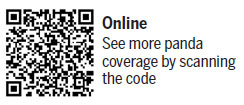Panda power
Updated: 2014-02-28 08:41
By Erik Nilsson (China Daily Europe)
|
|||||||||||
She had enjoyed seeing the creatures at Beijing Zoo and pointed out the animal's image on a pack of cigarettes sitting on a table - Deng Xiaoping was known for his preference for the Panda brand.
Before the Nixon visit, the US had arranged to send a couple of musk oxen to China.
"The (Nixon) administration believed the rare North American musk oxen would be unique to the zoos of China and would elicit great appreciation and interest among the Chinese people," the Richard Nixon Foundation's communications director Jonathan Movroydis says, and that is what happened.
But the interest in China surrounding the musk oxen was tame compared with the brouhaha the pandas ignited when they arrived at the National Zoological Park in Washington. About 1 million people lined up to see the pandas in the first weeks.
"Panda diplomacy is a lasting symbol of President and Mrs Nixon's historic trip to China in 1972 and the goodwill showed in what was the beginning of Sino-American relations after decades of non-communication," Movroydis says.
|
A man enjoys a light moment at a panda-themed hotel near the base of Emei Mountain in Sichuan province. Liu Zhongjun / For China Daily |
"Forty-two years on, we have only seen the friendship blossom and our bonds strengthen. The continuation of panda diplomacy embodies that spiritSince (China's) opening, the panda has come to symbolize China's arrival to the world stage as a great contributing member to the family of nations."
In the mid-1980s, rather than giving pandas to countries, China began leasing them to zoos. They typically pay $1 million (730,000 euros) a year for 10-year leases and agree that any cubs born abroad belong to China.
Merchandizing and ticketing generally make the investments worthwhile.
There are now 44 pandas in 12 countries, including the recent arrivals in Belgium. All but two, in Mexico, belong to China.
Another pair, Fu Wa and Feng Yi, will go to Malaysia in April to commemorate the 40th anniversary of diplomatic ties.
"The idea behind (these loans) is the countries trust each other enough to entrust the care of their most precious animals in the hands of their international partners," says Aleksandra Bojarowska, a University of Nottingham student who is completing a master's thesis on China's panda power.
Even though handing over pandas to countries as gifts has given way to leasing them, with the legal conditions that involves, pandas remain a natural source of soft power.
"China can position itself as a generous friend who is willing to send some of the rarest mammals on the planet to certain zoos," says Falk Hartig, a postdoctoral researcher of Chinese diplomacy at Goethe University in Frankfurt.
"What is helpful here is the fact the giant pandas only live in China, which makes it a unique public diplomacy tool."
But in the nebulous world of soft power, fluffy and fuzzy go hand in hand.
"If we understand soft power as winning hearts and minds, I'd say the panda might help to win hearts abroad but maybe not necessarily minds," Hartig says.
Many of those who see China as a threat see the dragon rather than the panda as China's natural emblem. But some academics say Chinese dragons are not menacing firedrakes but water-dwelling dispensers of good fortune.
There is even a school of thought in Chinese academia that advocates replacing the word dragon with its Chinese equivalent, long, in English texts to distinguish the fabled beast from its non-Chinese counterparts.
"In the West, the dragon is more associated with aggressiveness, hawkishness and the like," says Hartig, whose study Panda Diplomacy: The Cutest Part of China's Public Diplomacy was recently published in The Hague Journal of Diplomacy.
"The panda, on the other hand, is a symbol of peace, which fits much more with China's official foreign policy goals of building a harmonious world."
This charm extends beyond government realms to the public.
Michele Vaught, an American, believes both creatures are associated with China, but that the panda is more appropriate, at least as a tattoo. That is why Vaught, 28, had the Chinese characters for panda inscribed on her midriff when she visited the country in 2005.
"I don't even know where this dragon nation usage originates from. But it's used constantly in academic thesis statements. However, there are no real dragons. You can't go to a zoo or see a National Geographic photo of a dragon. And it's not quite the universally recognized symbol across all age groups like the panda is."
Even schoolchildren know where pandas come from, and the tattoo seemed like the perfect reminder of her visit.
"I thought: 'I love pandas; I'm in the land of pandas, and I can get a real Chinese tattoo in China.'
"Besides that, they're adorable, huge, fuzzy and ridiculous. They also remind me of hope, that even when things are looking bad, they can turn around. Maybe it appeals to the whole idea that humans are destroying the planet and killing off its diversity. But, hey, look, we're saving the pandas."
She also visited the pandas at Beijing Zoo.

The mostly Chinese crowds at the capital's panda pens show the animals are not solely a boon to China's international image but are also venerated at home.
Sun Lihong of Liaoning province says she and her daughter Bao Zhiyue, 17, decided to spend their holiday in February in Beijing partly so they could see the pandas.
"We came to see our national treasure," Sun, 44, says.
Like Vaught, Bao reckons pandas are a better representation of China than are dragons.
"Dragon's aren't real. And foreigners and Chinese think of them differently. But everyone views pandas the same way. They truly represent China and our hopes of peace and harmony."
Nearby, an American 2-year-old clutching a stuffed panda hugs a Chinese toddler carrying a panda-shaped bag. The crowd pulls away from the creatures they came to see to photograph the children.
"Look", the Chinese parents say to their daughter, pointing to the foreign girl's stuffed animal, smiling.
"She's got a panda, too."
Contact the writer at erik_nilsson@chinadaily.com.cn.
Xing Yi contributed to this story.
( China Daily European Weekly 02/28/2014 page1)
Today's Top News
Ukraine mobilizes after Putin's move
Manhunt after China's terror attack
War in Ukraine a long shot, experts say
Beijing-area air better than before
EU condemns China's terrorist attacks
Abe 'shut the door': spokesman
Putin not yet decided on use of force in Ukraine
28 dead in Kunming violence
Hot Topics
Lunar probe , China growth forecasts, Emission rules get tougher, China seen through 'colored lens', International board,
Editor's Picks

|

|

|

|

|

|






